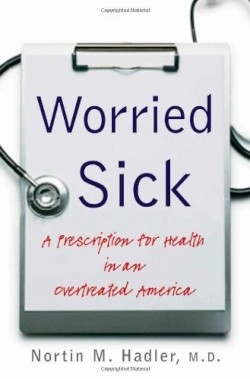Worried Sick
A Prescription for Health in an Overtreated America
American health care comprises approximately 16% of national productivity, yet some 40% of the population can’t afford the care they’re told they need. Hadler wrote Worried Sick to change this system he calls “ethically bankrupt and…financially unsustainable.”
Hadler serves as professor of medicine, microbiology, and immunology at the University of North Carolina and attending rheumatologist at UNC Hospitals. Author and editor of books for physicians and scholars, he also wrote The Last Well Person: How to Stay Well Despite the Health-Care System. His mission is “to endow those of you who are still well with the sophistication to be the keepers of your own wellness.”
Hadler asserts that screening tests and prescription drugs make little difference to the projected longevity of US citizens. Many ailments associated with aging can be mitigated with good coping skills. Relative comfort with socioeconomic status and job satisfaction affect each person’s ability to deal with health challenges. A sense of invincibility helps people feel strong and healthy; discontent at work or financial insecurity compromise this life view.
People who fail to cope with health issues as they age tend to “medicalize” them, turning conditions into diseases. Once labeling occurs, they seek cures, and pharmaceutical and medical entities aggressively continue to develop new but not necessarily better solutions.
Daily small-dose aspirin treatment to prevent heart attack raises the risk of gastrointestinal bleeding. The author believes that this risk, though small, offsets the alleged benefits of aspirin therapy, and only people who’ve had heart attacks should receive the treatment. Hadler says, “The absolute-risk reduction for the primary prevention of a heart attack, if there’s any risk reduction at all, is miniscule.”
This book challenges readers to alter their notions about health maintenance, discarding beliefs about the efficacy of certain medications, screening tests, and procedures. Supplementary chapters conclude the book, referencing research that supports the subject matter of each primary issue. The last chapter presents the author’s plan for much-needed changes in health insurance. This thoughtful message from an experienced medical practitioner has merit and may convince the general public to advocate more forcefully for change.
Reviewed by
Margaret Cullison
Disclosure: This article is not an endorsement, but a review. The publisher of this book provided free copies of the book to have their book reviewed by a professional reviewer. No fee was paid by the publisher for this review. Foreword Reviews only recommends books that we love. Foreword Magazine, Inc. is disclosing this in accordance with the Federal Trade Commission’s 16 CFR, Part 255.

